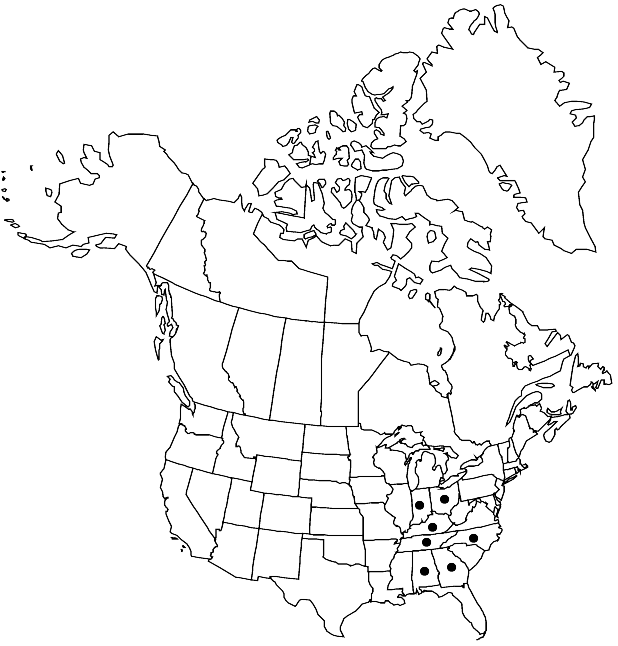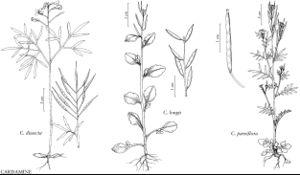Cardamine dissecta
J. Arnold Arbor. 69: 82. 1988.
Perennials; glabrous throughout. Rhizomes (tuberiform, fragile), moniliform, segments oblong, 3–5 mm diam., (fleshy). Stems erect, unbranched, 1–3.5 dm. Rhizomal leaves palmately compound (biternate), 7–20 cm, leaflets petiolulate; petiole 4–13 cm; lateral leaflets similar to terminal, blade sometimes smaller; terminal leaflet (petiolule 1–3 (–4) cm), blade ternately or pinnately lobed, (distal segment) linear, 0.7–3.5 cm × 0.6–3 mm, base attenuate to cuneate, margins entire (apiculate). Cauline leaves (2 or) 3, palmately compound (biternate, similar to rhizomal leaves, alternate to subopposite), petiolate, leaflets petiolulate; petiole (0.5–) 1–4 (–5.5) cm, base not auriculate; lateral leaflets similar to terminal; terminal leaflet (petiolule (0.3–) 0.7–1.5 (–2.5) cm), blade (ternate, distal segment) linear, (0.4–) 1.5–5 (–6.5) cm × 0.7–4 (–6) mm, base cuneate to attenuate, margins entire. Racemes ebracteate. Fruiting pedicels ascending to divaricate, 10–25 (–35) mm. Flowers: sepals oblong, 4–6 × 1.5–2 mm, lateral pair not saccate basally; petals white to pale-pink, oblanceolate, 9–15 × 2–4 mm, (not clawed, apex rounded); filaments: median pairs 6–7.5 mm, lateral pair 3–5 mm; anthers linear, 1.5–2.5 mm. Fruits linear-lanceolate, 2–3.5 cm × 1.5–2 mm; ovules 10–14 per ovary; style 4–7 (–10) mm. Seeds brown, oblong, 1.5–2.5 × 1–1.5 mm. 2n = 64, 112.
Phenology: Flowering Mar–May.
Habitat: Oak-hickory woods, moist loamy areas, floodplain woods, bluffs, rocky calcareous woods, limestone slopes, along streams
Elevation: 0-300 m
Distribution

Ala., Ga., Ind., Ky., N.C., Ohio, Tenn.
Discussion
Selected References
None.
Lower Taxa
"equal" is not a number."elongated" is not a number."thick" is not a number."dm" is not declared as a valid unit of measurement for this property.
